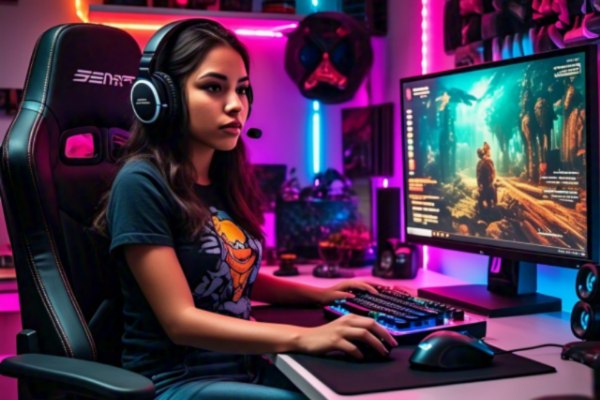Video games have come a long way from pixelated sprites and simple mechanics. Today, thanks to artificial intelligence and machine learning, gaming has become more immersive than ever. These technologies are revolutionizing how players interact with virtual worlds, making experiences more dynamic, personalized, and realistic. From intelligent NPCs to adaptive difficulty levels, AI is redefining what it means to be truly engaged in a game.

Smarter Non-Playable Characters (NPCs)
Gone are the days when NPCs followed rigid scripts and repeated the same lines endlessly. AI-powered NPCs now learn from player behavior, react in unpredictable ways, and adapt their strategies in real time.
Games like The Last of Us Part II use AI to make enemies communicate and change tactics based on the player’s actions. This not only increases the challenge but also makes the game world feel alive, creating a more immersive experience.
Adaptive Difficulty for a Tailored Experience
AI-driven difficulty adjustment ensures that games remain engaging without becoming too easy or frustratingly hard. Machine learning algorithms analyze player performance and adjust enemy behavior, puzzle complexity, or resource availability accordingly.
A great example is Resident Evil 4 Remake, where enemy aggression changes based on how well the player is performing. This keeps the gameplay balanced and engaging for both casual and experienced players.
Realistic Physics and Animations
Machine learning is enhancing physics simulations and character animations, making movements more fluid and lifelike. AI-powered animation tools analyze vast datasets to predict realistic character motions in real time.
This is evident in sports games like FIFA and NBA 2K, where AI-driven animation engines ensure smooth transitions between movements, reducing robotic or awkward motions. Such advancements make in-game actions feel more natural, deepening player immersion.
Procedural Content Generation
AI is enabling the creation of vast, detailed game worlds without requiring developers to design every element manually. Procedural content generation powered by machine learning allows games to generate unique environments, quests, and even dialogue dynamically.
Titles like No Man’s Sky use AI to create billions of planets, each with its own ecosystems and landscapes, ensuring no two players have the same experience. This limitless variation keeps games fresh and unpredictable.

Personalized Storytelling and Dialogue
Interactive storytelling has taken a giant leap forward with AI-driven narrative engines. Machine learning enables dynamic storylines where player choices have meaningful consequences, creating personalized gaming experiences.
Games like Cyberpunk 2077 and Detroit: Become Human use AI to offer branching narratives where decisions impact character relationships and story outcomes. This level of personalization makes players feel like they are shaping the game world, increasing emotional investment.
AI-Powered Voice Synthesis and Emotion Recognition
Voice acting and character interactions are becoming more immersive with AI-driven voice synthesis and emotion detection. AI can now generate realistic voice lines for NPCs, adjusting tone and emotion based on the player’s actions.
Some studios are even experimenting with AI-driven dialogue that changes dynamically, making conversations feel more natural. As this technology improves, we may soon see characters that truly “understand” and respond to players in real-time.
Enhanced Opponent AI in Multiplayer and Single-Player Games
Competitive gaming is being transformed by AI that provides smarter, more challenging opponents. In multiplayer games, AI-driven bots can mimic human behavior, making practice sessions more effective. In single-player modes, AI adversaries learn from player tactics and adjust their strategies, creating unpredictable and engaging battles.
Games like Alien: Isolation showcase this brilliantly, with an AI-controlled alien that actively hunts players by analyzing their patterns, keeping tension high throughout the experience.
The Future of AI in Gaming
As AI continues to evolve, the line between reality and virtual worlds will blur even further. Future developments could bring AI-generated narratives that adapt in real-time, voice assistants that guide players dynamically, and even AI-driven game directors that personalize every session.
According to a report by Accenture, AI in gaming is expected to grow into a $360 billion industry by 2030, highlighting the massive impact it will have on the future of entertainment.
AI Is Redefining Gaming
Artificial intelligence and machine learning are not just enhancing video games—they are redefining them. Whether through smarter NPCs, adaptive difficulty, or personalized storytelling, AI is creating richer, more immersive experiences that keep players engaged like never before.
As technology advances, the possibilities for AI-driven gaming are limitless, promising a future where games become more dynamic, responsive, and lifelike than ever imagined.
Some amazing gaming products you can’t miss out on:

Sceptre Curved 24.5-inch Gaming Monitor

BENGOO G9000 Stereo Gaming Headset

Xbox Series X 1TB SSD Console



